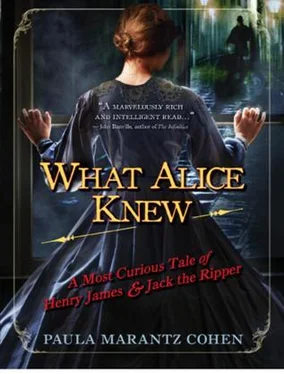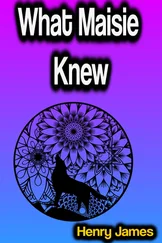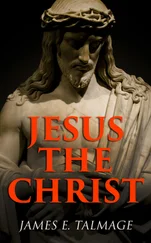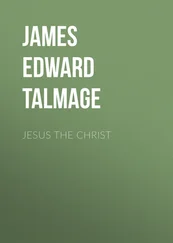Everyone turned to the speaker, a fair young man with a square jaw and hard, glittery blue eyes. Henry felt a welling of gratitude.
“That settles it, then.” Wilde laughed. “We must not allow you Americans to hurt each other. Now sit.” He pulled at Clemens’s sleeve. “We will drink some more wine. Our wine at least is better than yours, which is reason enough to settle here.”
Henry dropped into his chair. As the wine was poured and the ices served, he pondered the episode that had just transpired. Who was it who had intervened? He looked to the front of the room and saw that the young man who had saved him had moved off to the side and was combing through a bag of what looked like costume apparel. Henry felt suddenly light-headed. Was that the face he had seen and remembered at the beginning of the evening? For weeks he had been trying to recall something from the dinner party at Gosse’s (if it had been Gosse’s). He believed this young man had been there. Indeed, he was certain he was. A memorable face. How had he forgotten it?
Once the ices had been cleared and the Madeira served, Wilde stood up and raised his glass. “To art and song,” he said. “I promised on a recent occasion that we would perform some musical hall turns. We have rehearsed something for this evening.” He motioned to the young man, whom James had been watching in the corner, who stepped forward. He was holding a wig and a piece of drapery. He placed the wig on his head and wrapped the drape around his shoulders, curtsied, and smiled. Even in this makeshift ironic garb, he had managed a transformation. There was now a pretty young girl in place of a handsome young man. A natural gift for mimicry , thought Henry admiringly.
“We shall perform ‘Oh, False One, You Have Deceived Me’ from Pirates of Penzance, by our friends Messieurs Gilbert and Sullivan,” announced Wilde.
There followed a lively rendition of the song, a call and response of the conventional farcical variety. Wilde sang with requisite brio, and the young man, with a sweetly coquettish lilt. Light musical numbers were not to Henry’s taste, but he granted that Oscar and the young man performed well. Especially the young man.
At the end, Wilde bowed low, and his partner curtsied and pulled off his wig. There was enthusiastic applause by the guests—even the blasé Frenchmen seemed to have been entertained.
Henry joined vigorously in the applause. It seemed the young man was looking directly at him. Perhaps he wanted a sign of thanks for having intervened in the encounter with Clemens. He nodded an acknowledgment, but the young man did not blink. Perhaps he was not looking at him at all. Still, Henry could not avert his own gaze. He was transfixed by the young man’s eyes, which were glacially blue. He felt a shiver pass through himself.
“Who is he?” he whispered to Sargent.
“Walter Sickert. An apprentice to Whistler.”
An artist! “Is he any good?”
“Talented but macabre.”
“How’s that?” asked Henry sharply.
“Dark palette. Tawdry subjects.”
Wilde motioned graciously to the young man. “My friend here is even more gifted as a painter than as a music hall performer. You must all go see his work. Buy it or write about it, and make him more famous than Whistler. Do your imitation of Jimmy’s laugh again, Walter.”
“‘Ha ha!’” said the young man.
“That’s Jimmy!” cried Wilde. “‘Ha ha.’ You do it better.”
Henry caught his breath. It came back to him in a rush. They had talked of Jack the Ripper at that dinner party the night of his ordeal. This Sickert had been present at that occasion and had noted that the “ha ha” in the letters put him in mind of Whistler. He had imitated Whistler’s laugh, then!
Sickert. The name was suggestive. Dickensian, if Henry wanted the name for a murderer. Not that he did. Indeed, a feeling of warmth for the young man competed with a feeling of dread.
It had been an extremely stressful evening, one Henry would not want to repeat, but he had learned something of importance, though he did not know what it was. If his logical faculties were weak, his instincts were strong. He had found a germ. He would have to bring it to Alice and see what she could make of it.
At the same time that Henry was preparing for his dinner at the Albemarle Club, William was in a hansom cab heading to Mansell Street in Whitechapel. He had in hand the address of Benjamin Cohen that Abberline had gotten for him. It was unclear whether it was Cohen’s business establishment or his home—possibly it was both. From what he had discerned of the area, distinctions of home and work were not pronounced in the East End.
When William descended from the cab, he soon found that the address coincided with one of the small bookshops that cluttered the area and that he had wanted so much to peruse during his first visit to Whitechapel. But while most of the other shops were still open or just closing for the night, this one was shuttered and padlocked. When William gazed through the shutters, he saw that the shelves were bare, the fixtures removed from the walls, and the place apparently abandoned.
His first response was a lurch of panic. Had Benjamin Cohen been guilty after all and escaped justice due to William’s interference? A sense of dread began to rise in him, and he pulled himself back to reason by force of will, summoning to mind what had caused him to act in Cohen’s defense: the man’s intelligent and rational demeanor, the obvious scapegoating by Anderson, his own instinct regarding guilt and innocence.
He had calmed himself somewhat with this line of thought and decided to inquire about Cohen’s whereabouts of a group of men standing on the opposite corner, speaking animatedly in the Jewish tongue. The men were dressed in the conventional prayer shawls and skullcaps of the sect, perhaps waiting for sundown when they would hold their evening service. In the course of his research into comparative religion, William had been present for some of these ceremonies, which he had found at once exotic and familiar. All religion, as he saw it, was propelled by the same impulse: a need to believe in something larger than oneself. He saw the impulse, regardless of its manifestation, as an ennobling element in human nature, and the longer he lived, the less the various trappings that distinguished one religion from another made a difference to him.
He was about to cross over to talk to this group, but before he could do so, he found a figure blocking his way. The person was dressed, like the men across the street, in a fringed shawl and skullcap, but he was more than six feet tall, and his chest was so large that it pulled the coat that covered his vestments to bursting.
“What do you want here?” asked the sentinel pugnaciously. “Usually your kind comes round when it’s dark.”
William hadn’t realized that someone in a shawl and skullcap could look threatening, but this person did. He surmised that the man was assigned to keep watch on the street, a practical precaution, considering the level of crime in the area, not to mention the recent Ripper murders.
William pointed to the shop and mentioned the name of Benjamin Cohen.
“And what’s your business with him?” The man seemed to scowl more deeply.
“I’m not the police, if that’s what you think,” William explained quickly. “I’m a friend. Or at least, I’m someone in sympathy with…” He paused, trying to determine exactly with what he was in sympathy with regard to Cohen. “I am in sympathy with his position,” he finally finished vaguely.
The man eyed him with new interest. Perhaps he was sizing up the possibility that William might, after all, be a Jew of the exotic American variety. Or an anarchist. There had been mention of Cohen’s incendiary political activity, and William’s hair and beard were unkempt enough for that.
Читать дальше












